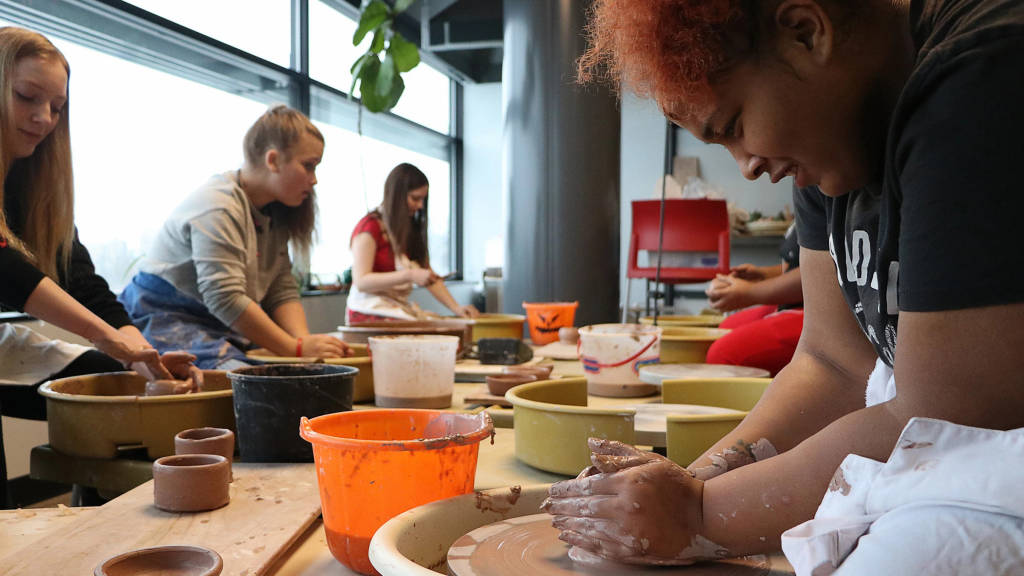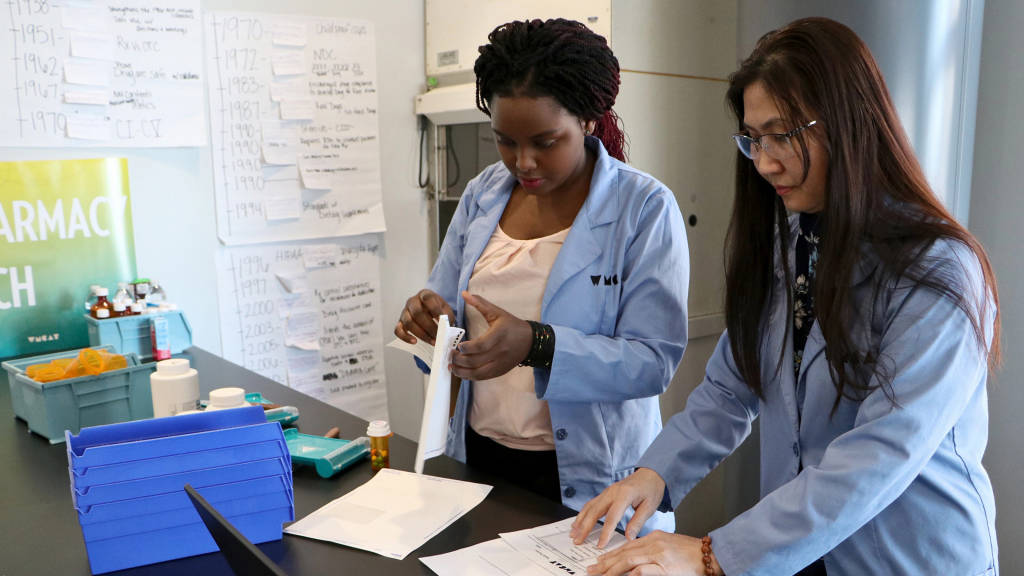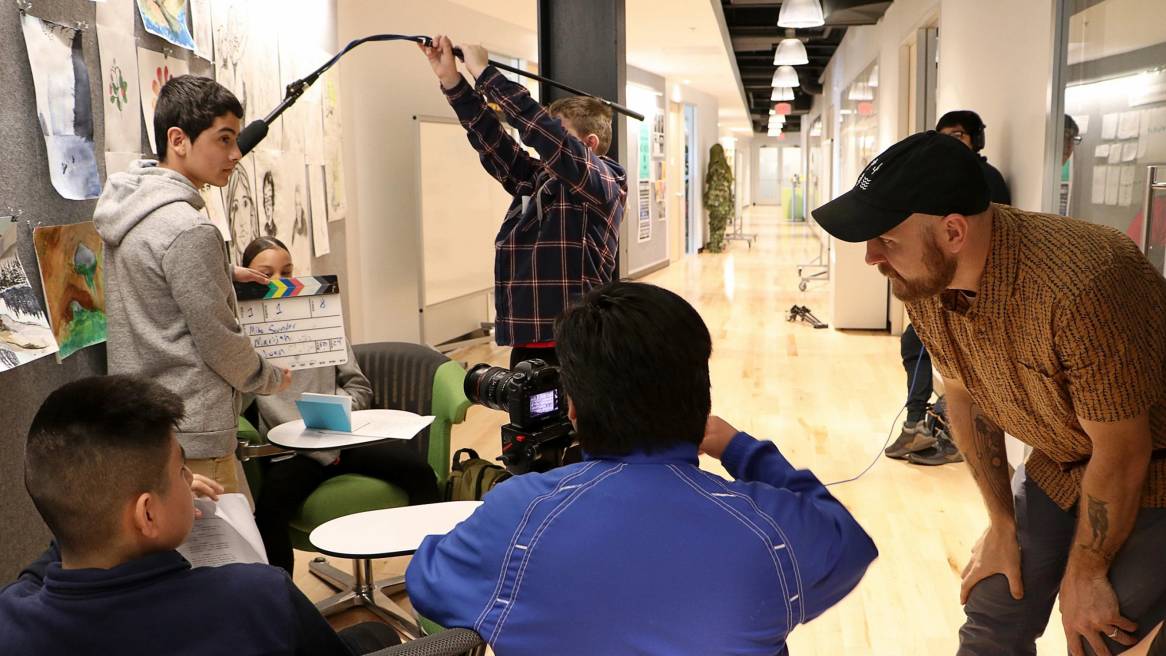Stepping Up
How Steelcase and WMCAT are helping teens and adults elevate their voices and providing equitable access to opportunity
What happens when a corporation decides to join forces with a nonprofit to tackle some of the biggest social and economic issues in their community? Daniel Williams, president and CEO of the West Michigan Center for Arts and Technology (WMCAT) and Kim Dabbs, director of social innovation at Steelcase, are both strong believers in businesses stepping up and diving in, going beyond mere philanthropy to become an active participant in the quest for real solutions.
360 spoke to them about how they’re working together to tackle pressing issues, such as inequality, improving education and creating sustainable cities and communities.
360: What is WMCAT’s mission and how does it relate to social innovation?
DW: WMCAT is a nonprofit in West Michigan that works really hard to help make economic and social progress in people’s individual lives, which creates a stronger community. Our focus is multigenerational and inclusive of the whole family. We offer arts and technology programming for middle school and high school kids to help them learn by doing. To help kids right out of high school who aren’t sure what’s next, we provide transition programming – a sort of gap year – to help them find direction and choose their own unique pathway forward. And we also have an adult workforce development program to help unemployed adults transition back into school, complete externships and transition into living-wage careers.
In addition to all that, during the past few years we’ve established two enterprises. Ambrose is a professional screen-printing company where kids in our gap year program can work and learn the skills needed to run a small business. Public Agency is a design thinking consultancy with an equity lens that works with organizations all over the country to help them problem solve and innovate new solutions for their communities. This not only helps us live our mission every day and expand our reach nationally, but it also creates a revenue stream to help advance our work.
360: Why did Steelcase decide to become involved with WMCAT?
KD: Supporting the communities where Steelcase employees live and work has always been central to how we do business. Several years ago we started rethinking the role Steelcase could play in helping solve some of the challenges West Michigan was facing. We knew there were some definite education gaps as well as employment-opportunity gaps, and our senior executives were really excited about the opportunity to move the needle of our impact by playing a more active role in tackling these equity issues.
We came to understand that Grand Rapids had a beautiful opportunity to not just replicate what places elsewhere were doing, but we could really make it our own and transform the entire sector of corporate support. And so, working with changemakers within WMCAT, we connected lots of dots to see how what we do at Steelcase – especially in the areas of education, design thinking and creating an environment for discovery, collaboration and innovation – could amplify WMCAT’s work. It was a great opportunity for us to transform a national model and become a global leader in social innovation.

360: And now Steelcase has similar efforts happening in places throughout the world, correct?
KD: Absolutely. Our latest partnership is in Akko, Israel, where kids from all religious and geographical backgrounds are now learning, creating and playing together in a space that Steelcase helped design. It’s a place of peace, gathering and understanding.
We’re proud to be a part of a global network committed to tackling pressing issues, whether that be reducing inequalities, improving education or having sustainable cities and communities.
We always try to think of our involvement as a portfolio of impact. How can we give money? How can we transform the work or workplaces? How can we help build a culture of innovation within the organization? Are we giving the most that we can as a partner? And is the impact going to be a long-lasting shift that produces positive change?
360: Daniel, I’ve heard you describe the arts and technology programs at WMCAT as a platform for social innovation. Tell me more about that.
DW: When people first hear about WMCAT, they often say, “Oh, are you trying to create professional artists?” That may happen, but that isn’t the intention. Instead, it’s using arts and technology as a way to help young people explore what’s around them and things they’re wrestling with. We give them tools they can use to find their voice and share their stories — to see themselves and be seen by others in different ways, to build their social capital. It’s not about WMCAT saying, “This is what you need to become.” Instead, it’s about us being there as a platform for folks to make into what they need.
360: How do you see lives being transformed because of WMCAT?
DW: There are so many stories I could tell, but here’s just one. Two years ago, a few kids in our video production studio asked the question, “Where are people of color in the music industry in Grand Rapids?” They talked through it as a cohort and decided to dig into the history of African-American music in Grand Rapids. That blossomed into a full-length documentary film project. They interviewed countless folks, went into the archives of the library and museums, and discovered this history that had previously seemed disconnected from them. At the same time, they also learned more about the desegregation of schools and what was happening with black-owned businesses in the community. After learning that the soul singer Al Green was from Grand Rapids, they found his high school yearbook and then went and talked to a friend of his who, turns out, had an old recording in his basement of Al when he was about 17 years old. As a result, they added that interview to the film after the first version was done.
So, making their documentary — “Rhythm and Race” — was an incredible process of growth, learning, discovery and persistence, and that doesn’t happen by accident; it happens when young people have the tools to follow their natural curiosity and use their voice. These kids were able to show their film in theaters around the city and do artists’ talks on stage, which built even more skills and confidence. Several of them have now gone on to college to continue to take what they’ve learned and embark on their next level.

360: What has Steelcase learned about how successful corporate/community collaboration can help others?
KD: We understand that in order to be a good partner, we need to listen first. Only then can we look for ways to leverage Steelcase talent to help figure out ways to co-design, prototype and create the shared impact we’re looking for. Daniel often says, “No one knows a community better than the people that live there.” That’s so true.
We’ve also learned that “doing with” requires a much deeper level of commitment and involvement than “doing for.” So we look for partners like WMCAT that collaborate radically with their communities. We look for places that take the human-centered approach, that measure their impact in the lives of people and not just the number of people served.
360: So, what’s next? What’s ahead for your organizations as you continue your work in social innovation?
DW: At WMCAT, we’re continuing to think about how to grow sustainably in ways that make it possible to fulfill our mission, increase our impact and expand on the progress we’ve already made. For example, five years ago earned income only accounted for five percent of our total budget. Today we’ve grown that to almost 30 percent through social enterprises that are connected to our mission. This means greater sustainability for our organization.
KD: At Steelcase we’re continuing to work on methods and mindsets of social innovation to really understand where and how innovation thrives in a meaningful way. What we’re seeing throughout all of our partner organizations is our shared focus on purpose and the role it plays in how we live. That leads to some big questions. What drives our communities from a purpose perspective? How can we find new ways to lead with purpose? How can we best mobilize champions among our thousands of employees throughout the world? How can we be the strongest partner to impact change?
When I think about the role of Steelcase in our communities, I see such a beautiful opportunity to unlock human promise in ways that go beyond our organization as well as within it. None of this is easy. But I believe with all my heart that it results in making us a better company and the world a better, more equitable place.
 Daniel Williams, EdD is the President and CEO of the West Michigan Center for Arts + Technology (WMCAT). A leader in urban education and facilitator in design thinking, Daniel works to advance equity in education and workforce development.
Daniel Williams, EdD is the President and CEO of the West Michigan Center for Arts + Technology (WMCAT). A leader in urban education and facilitator in design thinking, Daniel works to advance equity in education and workforce development.
 Kim Dabbs serves as director of social innovation and engagement at Steelcase. She has a passion for building a culture of opportunity and is leveraging that mindset as she partners with organizations leading transformational change projects around the world.
Kim Dabbs serves as director of social innovation and engagement at Steelcase. She has a passion for building a culture of opportunity and is leveraging that mindset as she partners with organizations leading transformational change projects around the world.


